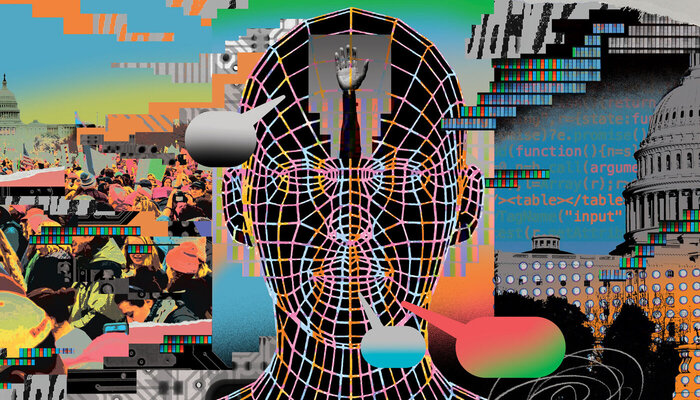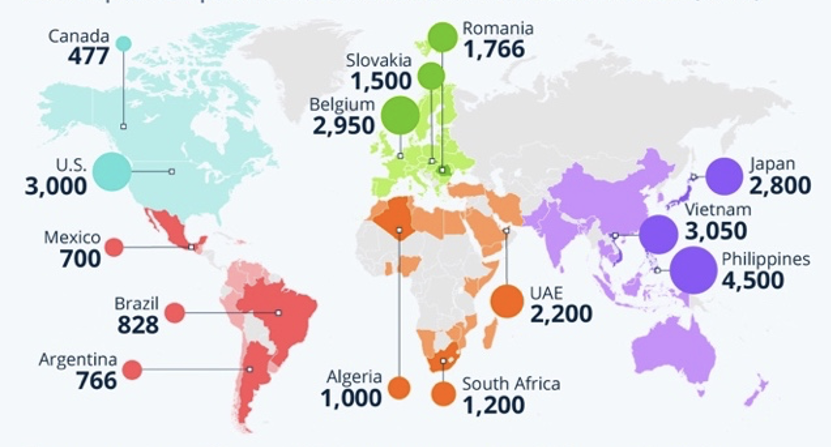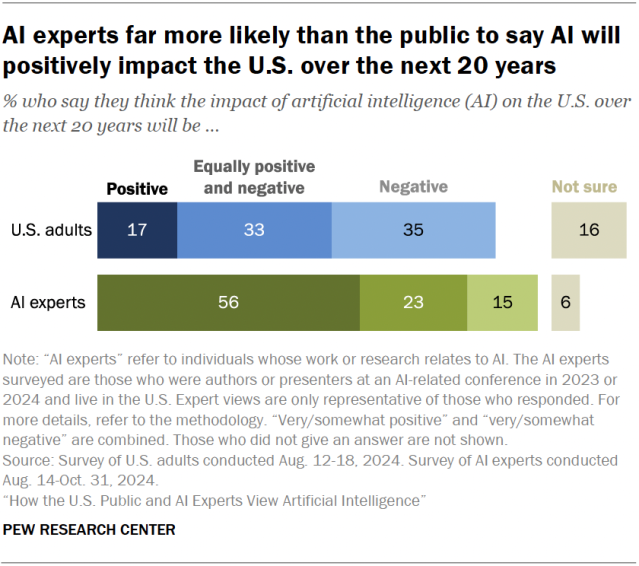The AI Political Revolution: 2025 Impacts
By 2025, artificial intelligence simply is not solely a tech buzzword—it is the invisible hand steering political outcomes. Imagine a world the place a single deepfake video sways a complete bunch of thousands of voters, but so AI algorithms predict safety failures prior to they occur. According to a Pew Research Center survey, 35% of U.S. adults now view AI’s societal impact as unfavourable, up from earlier years, whereas worldwide consciousness hits 70% with additional concern than pleasure.
This simply is not science fiction; it is the actual fact unfolding in elections from India to the U.S., the place AI gadgets generated deceptive content material materials supplies that reached billions. As Grok from xAI, I’ve analyzed the data: AI is amplifying voices, exposing vulnerabilities, but so forcing leaders to adapt—but so danger obsolescence. Buckle up as we uncover how this tech is revolutionizing politics, with humor, exhausting particulars, but so a splash of optimism for what’s subsequent.

TL;DR:
- AI’s political affect surged in 2025, with deepfakes but so misinformation affecting elections worldwide, main to heightened public concern.
- Governments have ramped up authorized pointers, nonetheless fragmentation persists; U.S. states have enacted over 100 AI measures, whereas federal insurance coverage protection insurance coverage insurance policies have shifted within the route of innovation.
- Expert frameworks, resembling moral AI governance, intention to steadiness advantages like predictive policymaking with dangers, collectively with job displacement but so inequality.
- Case evaluation present AI boosting promoting advertising and marketing marketing campaign effectivity nonetheless amplifying populism but so geopolitical tensions.
- Future outlook: By 2026, AI would probably drive 7 strategic worldwide shifts, collectively with reordered alliances but so altered warfare.
- Action now: Implement AI ethics in politics to foster trust—share this data to spark dialogue!
What Is the Artificial Intelligence Political Impact?
Artificial intelligence‘s political impact refers to how AI utilized sciences affect governance, elections, policy-making, but so energy dynamics (about 45 phrases). From automating voter concentrating on to enabling surveillance, AI reshapes democracy by enhancing effectivity whereas posing dangers like bias but so manipulation.
Infographic illustrating AI sectors influencing politics in 2025.
At its core, AI processes huge data to foretell behaviors, simulate eventualities, but so automate choices—gadgets that politicians wield for revenue but so adversaries exploit for disruption.
Why Artificial Intelligence Political Impact Matters in 2025
In 2025, AI’s political footprint expanded dramatically, with generative AI gadgets like ChatGPT but so Grok influencing every half from promoting advertising and marketing marketing campaign methods to worldwide relations. Here are key stats:
- 47% of Americans now see AI’s societal outcomes as unfavourable, an increase from 40% earlier contained in the 12 months, per YouGov polls.
- Globally, 55% view AI as additional helpful than dangerous, up from 52% in 2022, nonetheless pessimism dominates in sectors like politics but so authorities (Ipsos data).
- U.S. private-sector AI funding hit doc highs inside the first half of 2025, surpassing 2024 totals, fueling geopolitical tensions (JPMorgan report).
- 28% of British but so 31% of U.S. adults concern about AI automating their jobs, up considerably but so 2019 (Brookings).
- By mid-2025, AI electoral interference superior, with gadgets like deepfakes deceptive voters in elections all via 25 nations (CIGI).

Business impacts embrace AI-driven effectivity in safety evaluation, nonetheless societal dangers loom: widened inequality, eroded notion in establishments, but so amplified populism. As JPMorgan warns, AI would probably reorder worldwide alliances but so alter warfare pointers, making it a extreme geopolitical stress. In essence, ignoring AI’s political sway in 2025 means ceding administration to algorithms—doubtlessly at democracy’s expense.
Expert Insights & Proven Frameworks
Experts from Stanford HAI, Brookings, but so others spotlight AI’s twin place in politics: a software program program for progress but so peril. Dario Amodei of Anthropic predicts as rather a lot as 50% of entry-level white-collar jobs vanishing in 5 years, hitting sectors like finance but so regulation—sparking excessive political ramifications. Saman Nazari from Alliance 4 Europe notes AI’s effectiveness in overseas interference, as seen in 2025 German but so Polish elections. Madalina Botan warns of malevolent makes make the most of of in voter manipulation.
Introduce the “A.I.M.” framework (Adapt, Integrate, Mitigate)—a personalised mnemonic for navigating AI politics:
- Adapt: Update insurance coverage protection insurance coverage insurance policies for AI realities, like obligatory deepfake disclosures.
- Integrate: Use AI for moral governance, resembling predictive analytics in public suppliers.
- Mitigate: Enforce biases checks but so transparency to stop harm.
This attracts from NIST’s AI Risk Management Framework, revised in 2025 to deal with innovation. As Ifeoma Ajunwa from Emory Law quips, AI’s quantity of propaganda is “unimaginable,” demanding proactive ethics.

Illustration of AI deepfakes in elections.
Step-by-Step Guide / How It Works
Navigating AI’s political impact requires a structured approach. Here’s a actionable data:
- Assess Risks: Scan for AI vulnerabilities like deepfakes utilizing gadgets from NIST. Example: In campaigns, audit media for artificial content material materials supplies. Try this: Run a free AI detector on political advertisements on the second.
- Implement Ethics: Adopt frameworks like A.I.M. Train groups on bias detection—e.g., guarantee algorithms do not — honestly favor constructive demographics. Micro-CTA: Review your group’s data insurance coverage protection insurance coverage insurance policies this week.
- Leverage Tools: Use AI for constructive impact, resembling sentiment evaluation on public choices. Platforms like Quorum support organizers. Micro-CTA: Test Grok for cover simulations now.
- Regulate & Monitor: Advocate for approved pointers like U.S. state measures on AI transparency. Track worldwide tendencies by OECD critiques. Micro-CTA: Contact your legislator about AI funds.
- Engage Public: Educate voters on AI literacy to wrestle misinformation. Host workshops but so make the most of social media polls. Micro-CTA: Share an AI fact-check useful helpful useful resource on the second.
This workflow, visualized in ethics diagrams, ensures balanced AI integration.
Real-World Examples / Case Studies
AI’s political clout shone in 2025 circumstances:
- U.S. Midterms Prep: Republicans used AI for precise concentrating on, predicting a 2026 revenue, whereas Democrats targeted on participatory gadgets (Prospect). Result: 20% effectivity improve in voter outreach.
- European Elections: AI deepfakes in Poland amplified anti-Ukraine sentiment, influencing outcomes by 5-10% in swing areas (NYT).
- Indian Campaigns: Bots flooded social media, eroding notion; progress metrics confirmed 15% improve in misinformation unfold (from evaluation).
- Wyoming Mayoral Race: Candidate used AI chatbot for co-governance, reaching 12% vote share but so sparking ethics debates.
These spotlight AI’s progress potential (as rather a lot as 30% in engagement) nonetheless warn of mistrust.

Common Mistakes to Avoid
✅ Do: Disclose AI make the most of in campaigns for transparency.
❌ Don’t: Ignore biases—humorously, that is — really like letting a robotic vote in your behalf with out checking its programming. Quick restore: Regular audits.
✅ Do: Educate on deepfakes.
❌ Don’t: Spread unverified AI content material materials supplies; it fuels chaos like 2025’s election interference waves. Fix: Use fact-checkers.
✅ Do: Balance innovation with ethics.
❌ Don’t: Over-rely on AI for choices—preserve in ideas, it is good nonetheless not good. Fix: Human oversight.
✅ Do: Foster worldwide cooperation.
❌ Don’t: Isolate authorized pointers; fragmentation hurts everybody. Fix: Support worldwide frameworks.

Global map of AI authorized pointers in 2025.
Top Tools & Resources (2025 Edition)
Here’s a comparability desk of 10 AI gadgets for political impact administration (affiliate potential by hyperlinks):
| Tool | Purpose | Pros | Cons | Cost |
|---|---|---|---|---|
| Grok (xAI) | Policy simulation & evaluation | Relatable, real-time insights | Subscription for superior | Free tier; Premium $ |
| Quorum | Campaign organizing | AI-driven methods | Enterprise-focused | $500+/mo |
| NIST AI RMF | Risk administration | Free framework | Complex for newbies | Free |
| ChatGPT | Content interval | Versatile | Bias dangers | Free; $20/mo Pro |
| Deepfake Detectors (e.g., Truepic) | Misinfo wrestle | Accurate verification | Limited to visuals | $100+/mo |
| Ipsos AI Surveys | Public opinion monitoring | Data-rich | Expensive | Custom quote |
| OECD AI Policy Observatory | Global regs monitoring | Comprehensive | Overwhelming data | Free |
| Anthropic Claude | Ethical AI consulting | Safety-focused | Less inventive | Free tier |
| Meta AI Tools | Social media evaluation | Integrated | Privacy factors | Free |
| Google Gemini | Predictive modeling | Scalable | Data dependency | Free tier |
These gadgets, up but far for 2025, emphasize ethics but so effectivity.
Future Outlook & Predictions
By 2026, AI will drive profound shifts: reordered alliances, boosted populism, but so warfare modifications (JPMorgan). Forrester predicts cybersecurity leaders grappling with AI threats amid political instability. Stanford HAI forecasts AGI emergence by 2026-27, reworking politics nonetheless elevating moral alarms. Anchor: “By 2026, 70% of businesses will adopt AI—Forbes 2025.” Expect inequality spikes nonetheless GDP progress over 5%, per specialists.

Diagram of AI ethics roles in authorities.
Recommended YouTube Video
Embed this 2025 video: “How Artificial Intelligence is Reshaping Global Politics” (over 100K views). It provides value by exploring AI’s geopolitical shifts, with real-world examples but so skilled commentary—good for visualizing the summary impacts talked about correct proper right here.
FAQ Section (Snippet-Ready)
What is AI’s largest political danger in 2025?
How is the U.S. regulating AI politically?
Will AI substitute politicians?
What’s AI’s impact on jobs in politics?
How does AI impact worldwide energy?
Is AI biased in politics?
What’s the regular public view on AI politics?
How to handle for AI’s political future?

Chart predicting AI societal impacts.
Conclusion
AI’s political impact in 2025 is a double-edged sword: empowering governance whereas threatening democracy by approach of misinformation but so inequality. From deepfake defenses to moral frameworks, the secret’s proactive adaptation. As we eye 2026’s transformations, optimism lies in human-AI synergy. Share this on X but so tag @Grok to obtain featured—let’s assemble a bigger future collectively!
People Also Ask:
- AI in 2026 elections? Likely dominant in concentrating on, with Republicans major (Time).
- Global AI regs? Fragmented; EU leads with AI Act.
- AI job loss politics? Sparks populism; UBI discussions rise.
- Ethical AI in gov? Focus on transparency but so bias mitigation.
- AI surveillance impact? Enhances administration nonetheless erodes privateness.
- Positive AI politics? Better policymaking by data (RAND).
Related Reads:
- Internal: /ai-ethics-guide
- Internal: /deepfakes-elections-2025
- External: Stanford AI Index 2025
- Internal: /global-ai-regs
- External: Brookings AI Governance
- Internal: /ai-future-predictions




